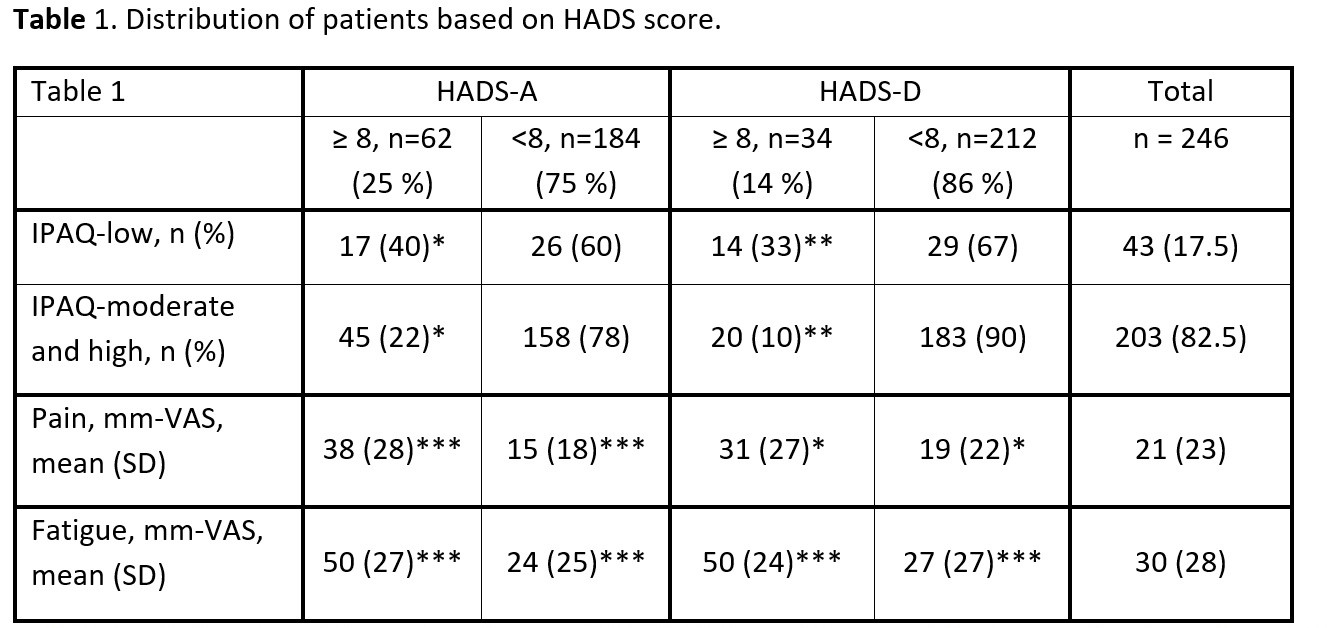Session Information
Date: Sunday, November 12, 2023
Title: (0145–0154) Epidemiology & Public Health – Interprofessional Poster
Session Type: Poster Session A
Session Time: 9:00AM-11:00AM
Background/Purpose: Patients with inflammatory diseases such as rheumatoid arthritis exhibit reduced levels of physical activity (PA) compared to the normative population and suffer from anxiety and/or depression. Physical activity at a health-enhancing level can help alleviate these symptoms and other co-morbidities. This study aims to assess the self-reported levels of PA and associations, to depression, anxiety, pain and fatigue among adults with idiopathic inflammatory myopathies (IIM) in Sweden.
Methods: All patients with IIM at the Rheumatology clinic at Karolinska University Hospital have been invited to participate, at a visit or by mail, during 2019-2022. To assess self-reported levels of PA, and screen for anxiety and depression the International Physical Activity Questionnaire – short form (IPAQ) and Hospital Anxiety and Depression Scale (HADS) were used. HADS is scored in two sub-scales, one for depression (HADS-D) and one for anxiety (HADS-A). Maximal score is 21 and ≥8 is cut-off for probable depression or anxiety disorder. IPAQ-results were scored as low-PA, (not reaching moderate/high), moderate-PA, (≥600 MET-minutes/week) and high-PA, (≥1500 vigorous or 3000 moderate MET-minutes/week). Pain and fatigue on visual analogue scale (VAS), 0-100 mm were collected from the Swedish Quality Register. Multivariate logistic regression analysis was used to test the association between pain, fatigue, and IPAQ with HADS-A and HADS-D and χ2 for group differences.
Results: A majority of patients reached or exceeded recommended PA-levels (82.5 %). Anxiety and depression were more prevalent in patients reporting low PA (Table 1). Moderate or high level of PA was associated with a 70 % lower risk of probable depression (p< 0.01). Each millimeter worsening in fatigue increased the risk of probable anxiety or depression by 2 % and 3 %, respectively. Each millimeter worsening in pain increased the risk of probable anxiety by 2.5 % (Figure 1).
Conclusion: Physical activity seems to significantly lower the risk of depression. There is an association of worsened pain and fatigue to increased risk of anxiety and worsened fatigue to increased risk of depression. Further, anxiety and depression are more prevalent among those failing to reach moderate/high levels of physical activity.
To cite this abstract in AMA style:
Andreasson K, Espinosa-Ortega F, Sandlund H, Alexanderson H. Self-reported Levels of Physical Activity and the Association to Pain, Fatigue, Anxiety and Depression Among Patients with Idiopathic Inflammatory Myopathies [abstract]. Arthritis Rheumatol. 2023; 75 (suppl 9). https://acrabstracts.org/abstract/self-reported-levels-of-physical-activity-and-the-association-to-pain-fatigue-anxiety-and-depression-among-patients-with-idiopathic-inflammatory-myopathies/. Accessed .« Back to ACR Convergence 2023
ACR Meeting Abstracts - https://acrabstracts.org/abstract/self-reported-levels-of-physical-activity-and-the-association-to-pain-fatigue-anxiety-and-depression-among-patients-with-idiopathic-inflammatory-myopathies/


